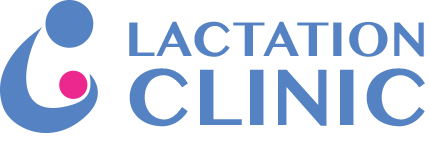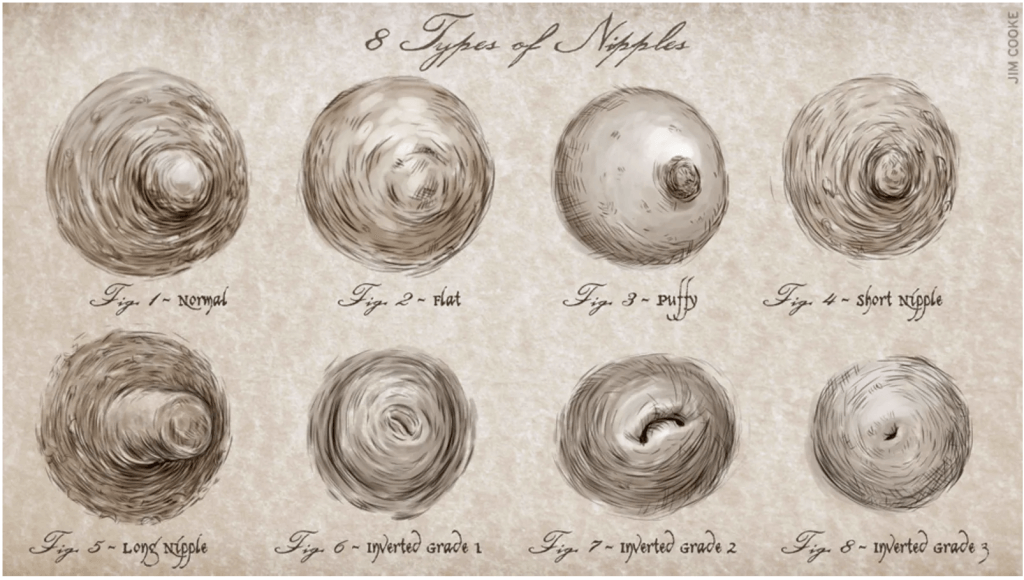Did you know that one of the biggest concerns or obstacles to the successful breastfeeding can be the shape of your nipples? You may have heard about a “misfortune” if one is born with flat or inverted nipples. I’ll try to bring some positivity and sense to this complicated issue.
To latch on and start their breastfeeding journey your newborn needs your breast more than your nipple. They are already born with some reserve calories and fluid resources for those few first days while their main goal is to learn how to latch onto the breast no matter what shape and size of the nipples. First milk (colostrum) is already there and those drops should be enough for your baby to stay hydrated and nourished while learning how to latch. Every healthy and term newborn should be given a chance to perform a so called breast crawl towards the breast, finding the breast and latching onto it with little to no assistance. Usually this is enough for them to get the right idea and to become a competent “latcher”. At this point your baby really does not care if your nipples are small, flat, or inverted.
Here is nice illustration by Jim Cooke, showing how many shapes of nipple are out there. One is missing, though: when there’s no nipple at all, only few openings on a completely flat areola. In my experience I have attended to such a patient and we were still able to figure it out so she could exclusively breastfeed her sweet baby!
If you’re still in the colostrum stage, i.e. your milk has not came in yet, your breast should be soft and “modifiable” in a way your baby needs it in order to have a deep latch. Some major concerns at this point could be: too long nipples or too wide nipples, or too long & too wide at the same time nipples.
Too long nipples can trick you and your healthcare professional into thinking as if the baby is having a great latch, when in reality, baby is staying only on the nipple, doing so called ‘nipple-feeding’ instead of breastfeeding. In such case your nipples quickly become very sore and you don’t see actual baby’s drinking at the breast. You can try to fold your nipple by pressing with your thumb at the base of your nipple, and releasing it the second prior baby is almost done with latching onto your breast.
Too wide nipples could become real obstacle for small babies. Each baby has a very limited space in their mouth, so in case of a tiny baby and a very wide nipple it could be a problem to have enough room in their mouth for your nipple and your breast tissue. Again, try your best in “folding” your still soft breast together with your nipple and maybe this will be enough!
Too long and too wide nipples do exist as well. You’re lucky if your baby is big and can achieve a truly deep latch. Make sure there’s no nipple-feeding happening and you don’t feel any discomfort like sore nipples. Multiple “folding” and shaping can do the trick. Try all possible variations of this, you might find one working for you!
Flat nipples are the least problematic. They get longer when you have a good latch and baby starts to suckle – this is how suction affects them. Just make sure your breast is soft enough so your baby could latch onto it. In other words: flat nipples are as good as normal nipples and you’re lucky if you have them.
Inverted nipples are one of the biggest challenges for everyone. From my private practice experience I can conclude that mothers have their best chance to have an exclusive breastfeeding just by using bare breast if they reach out for a Lactation Consultant help during the first 24-28 hours postpartum. During this short period, the breast is at its softest and most elastic condition, so one can really shape it as needed, and the baby is not yet used to the silicon shape and texture in their mouth. This is the time when you really must know how to latch a baby onto any possible breast. It requires years of practice and a very specialized training to perform this procedure successfully, and not to avert the baby from the breast. Our team of Lactation Consultants is constantly learning something new from the best professionals in our field, so we could help you in your particular situation. By the way, if by any chance you are not pregnant and not breastfeeding, do yourself a favour and find a trusted Osteopath or a Chiropractor and try to resolve this issue with their help beforehand. We are dealing with some constriction here and gentle bodywork could really help you!
If you have no idea how to do the above mentioned nipple ‘folding’ and breast shaping, our team can help! Sometimes, babies are born with a very sensitive gag reflex and in such case they actually start gagging. An actual deep latch, along with the long nipple, can trigger the gag reflex, or they have no room in their mouth enough to latch onto without damaging the nipple and causing the pain. If this is your case, despite anything you’ve already tried, just start milk expressing to keep your milk supply and use finger-feeding for few days and then try again. Your baby is growing bigger with every passing day, and they will really outgrow this situation! Skilled Osteopath or Chiropractor can help to resolve this problem faster.
What about nipple shields? We can state that we do not judge moms using them, and, moreover, we do not undermine them saying that in such case there’s no breastfeeding happening. It’s happening. You’re still using your breasts and your milk to feed your baby. And we are certain it was not the first thing you’ve grabbed after your baby was born. And our guess is you’d still like to wean from it ASAP! Because it’s an additional burden of your new reality. We are ready to help you! We look at the nipple shield as one of the possible tools at your disposal, and, usually, only as temporary stepping stone on the road to an easier breastfeeding. There are few things to remember when using nipple shields:
- nipple shields do not convert breast to the bottle, i.e. baby still has to latch onto the breast, not only the nipple;
- make sure you use it correctly;
- make sure your baby is actually drinking while using it.
If you did not achieve a good latch prior to your milk coming in, and suddenly you have found yourself in the situation when your breasts are swollen and engorged (sometimes, to a very severe extent), your nipples are already sore and your baby cannot latch and get the milk out – try to resolve your engorgement, express the milk, feed the baby using one of the alternative methods, in other words – it’s about time to call an expert.
If you require urgent help with breastfeeding:
Call or text @ 416-804-9300


